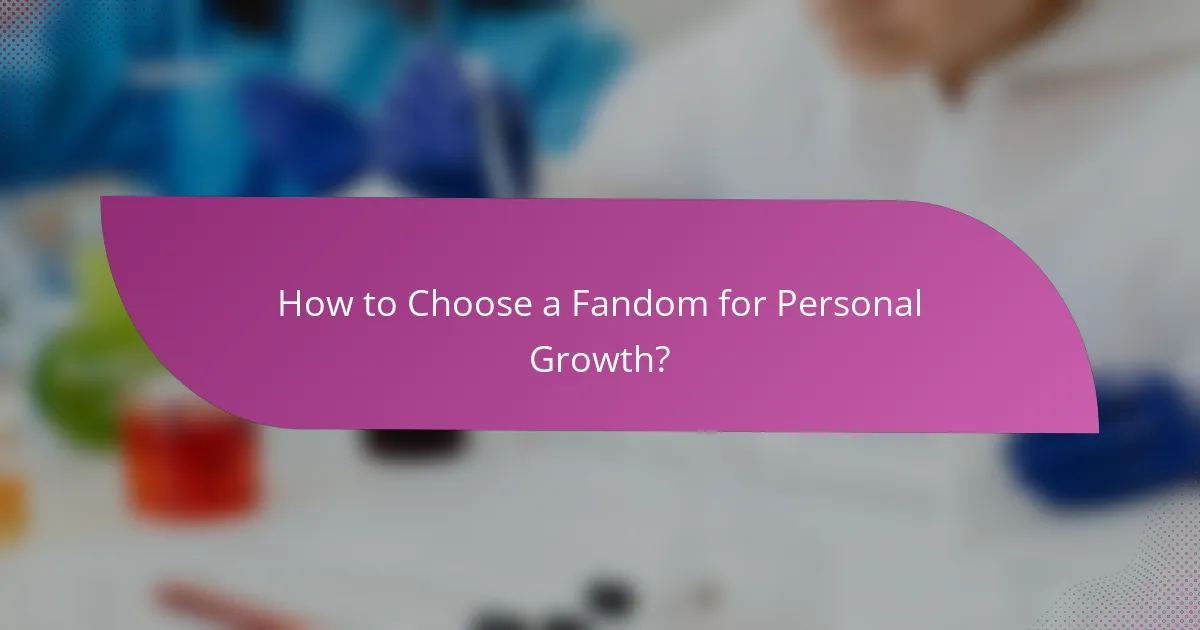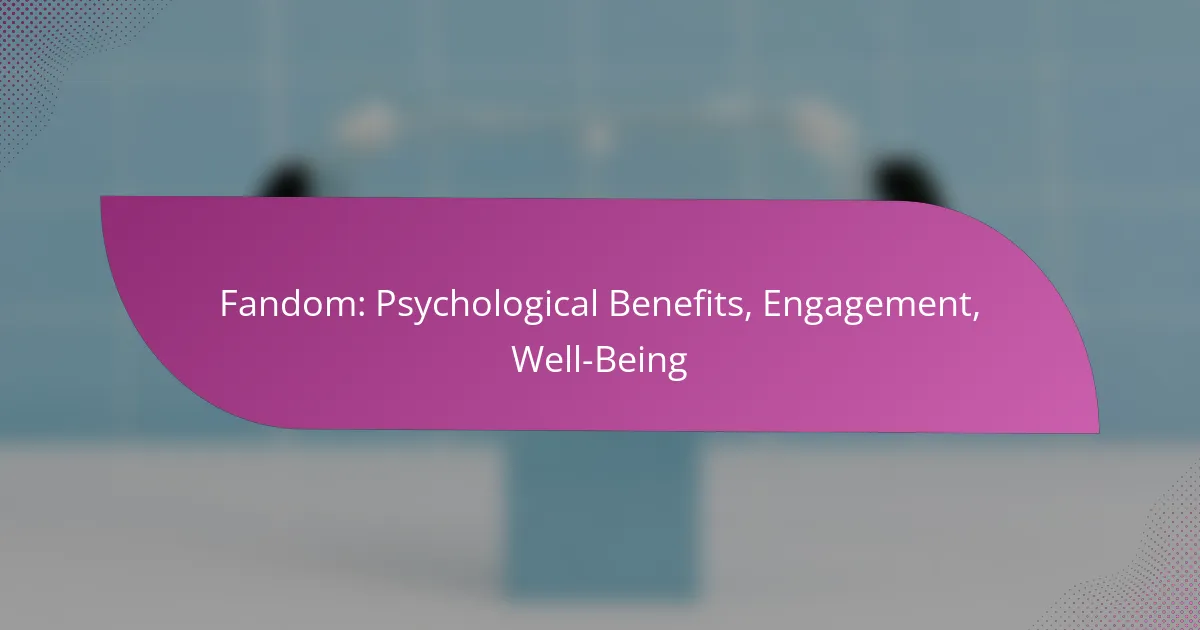Fandom plays a crucial role in enhancing psychological well-being by fostering connections and providing emotional support through community engagement. By actively participating in fan communities, individuals can experience increased self-worth and a sense of belonging, which contribute positively to their mental health and overall life satisfaction.

How Does Fandom Enhance Psychological Well-Being?
Fandom enhances psychological well-being by fostering connections, boosting self-worth, and providing emotional support through community engagement. These elements create a positive feedback loop that can significantly improve mental health and life satisfaction.
Increased sense of belonging
Being part of a fandom cultivates a strong sense of belonging, as individuals connect with others who share similar interests and passions. This shared identity can lead to meaningful friendships and a supportive network, which are crucial for emotional health.
Engaging in fandom activities, such as attending conventions or participating in online forums, can deepen these connections. The sense of belonging often translates into increased happiness and reduced feelings of isolation.
Improved self-esteem
Fandom can significantly boost self-esteem by allowing individuals to express themselves and their interests freely. When fans engage in creative activities, such as fan art or writing, they gain recognition and validation from their peers, which enhances their self-worth.
Moreover, fandoms often celebrate diversity and individuality, encouraging members to embrace their unique traits. This acceptance can lead to a more positive self-image and greater confidence in social situations.
Emotional support through community
Fandom communities provide vital emotional support, offering a safe space for individuals to share their experiences and feelings. Members often rally around each other during difficult times, creating a sense of solidarity that can be comforting and uplifting.
Participating in discussions or support groups within a fandom can help individuals process their emotions and feel understood. This communal support can be particularly beneficial during challenging life events, reinforcing the idea that no one has to face their struggles alone.

What Are the Engagement Benefits of Fandom?
Fandom offers significant engagement benefits, enhancing emotional well-being and social connections. By actively participating in fan communities, individuals can find a sense of belonging and purpose, which contributes positively to their mental health.
Active participation in fan communities
Engaging in fan communities allows individuals to connect with others who share similar interests, fostering a sense of belonging. This participation can take various forms, such as joining online forums, attending conventions, or participating in social media groups dedicated to specific fandoms.
Active involvement often leads to deeper relationships and friendships, as members collaborate on projects or discuss their favorite topics. This shared enthusiasm can create a supportive environment that enhances emotional resilience and reduces feelings of isolation.
Creative expression through fan art and writing
Fandom encourages creative expression, allowing fans to create art, stories, and other content inspired by their favorite media. This creative outlet not only provides a way to engage with the material but also helps individuals develop their artistic skills and explore their personal identities.
Participating in fan art or writing can lead to recognition within the community, boosting self-esteem and motivation. Sharing these creations on platforms like DeviantArt or Wattpad can also facilitate feedback and collaboration, enriching the creative experience.
Opportunities for social interaction
Fandoms serve as a platform for social interaction, where fans can meet both online and offline. Events like fan conventions or local meet-ups provide opportunities for fans to connect face-to-face, strengthening community ties and friendships.
Additionally, online interactions through social media or gaming platforms allow for continuous engagement, where fans can discuss theories, share news, or collaborate on projects. These interactions can enhance social skills and provide a sense of community, which is vital for overall well-being.

How Can Fandom Improve Mental Health?
Fandom can significantly enhance mental health by providing a sense of belonging, purpose, and emotional support. Engaging with a community centered around shared interests helps individuals cope with life’s challenges and fosters overall well-being.
Distraction from stressors
Fandom offers a valuable escape from daily stressors by immersing individuals in alternative worlds and narratives. This distraction can reduce anxiety and provide a temporary reprieve from real-life pressures, allowing fans to recharge mentally.
For example, watching a favorite show or reading a beloved book can shift focus away from personal troubles, creating a mental buffer. Engaging with fandom activities, such as attending conventions or participating in online discussions, can further enhance this effect.
Development of coping mechanisms
Being part of a fandom encourages the development of coping strategies that can be beneficial in managing stress and emotional challenges. Fans often share their experiences and techniques for dealing with difficult situations, fostering a supportive environment.
For instance, discussing character arcs or plot resolutions can help fans process their own emotions and gain new perspectives. This communal sharing not only strengthens bonds but also equips individuals with practical tools to navigate their own struggles.
Therapeutic benefits of storytelling
Storytelling within fandoms can have therapeutic effects by allowing individuals to explore complex emotions and situations in a safe context. Engaging with narratives can facilitate emotional expression and understanding, promoting healing and personal growth.
Fans often relate to characters’ journeys, which can mirror their own life experiences. This connection can validate feelings and inspire resilience, making storytelling a powerful tool for emotional well-being.

What Factors Influence Fandom Engagement?
Fandom engagement is shaped by various factors that determine how individuals connect with their interests and communities. Key influences include personal interests, the accessibility of content, and the dynamics within fandom communities.
Personal interests and preferences
Individual interests play a crucial role in fandom engagement. Fans are more likely to immerse themselves in communities that align with their personal tastes, whether in music, movies, games, or sports. For instance, a fan of a specific genre, like fantasy or sci-fi, will seek out related content and communities that resonate with those themes.
Moreover, preferences can evolve over time, leading fans to explore new areas within their fandom. This evolution can enhance engagement as fans discover new aspects of their interests, such as attending conventions or participating in online discussions.
Accessibility of content
The ease of accessing content significantly affects fandom engagement. Fans are more likely to participate if they can easily find and consume media related to their interests. This includes availability on streaming platforms, social media, and fan sites.
For example, a series available on multiple streaming services or platforms will likely attract a larger fan base. Conversely, content that is difficult to access may limit engagement, as fans may not invest time in searching for it.
Community dynamics and culture
The culture and dynamics within fandom communities greatly influence engagement levels. Supportive and inclusive environments encourage participation, while toxic or exclusive cultures can deter fans from joining or remaining active.
Communities that foster interaction, such as through forums or social media groups, often see higher engagement. Fans who feel a sense of belonging are more likely to contribute, share experiences, and participate in events, enhancing their overall fandom experience.

How to Choose a Fandom for Personal Growth?
Choosing a fandom that promotes personal growth involves aligning your interests with supportive communities and engaging activities. This ensures that your experience is enriching and contributes positively to your well-being.
Identify personal interests
Start by reflecting on what captivates you. Consider genres, themes, or characters that resonate with your values and passions. This could range from fantasy literature to superhero films or even niche interests like tabletop games.
Once you have a list, prioritize your top interests. Engaging deeply with something you love will enhance your motivation and commitment, making the fandom experience more fulfilling.
Evaluate community support
A strong community can significantly enhance your fandom experience. Look for groups that are welcoming, inclusive, and share similar values. Online platforms like forums, social media groups, or local clubs can provide a sense of belonging.
Assess the community’s activity level and responsiveness. Active communities often offer support through discussions, events, and collaborative projects, which can foster personal connections and growth.
Consider engagement opportunities
Evaluate how you can actively participate in the fandom. This could include attending conventions, joining fan clubs, or contributing to fan art and writing. Engaging in these activities can deepen your connection and provide valuable experiences.
Look for opportunities that challenge you, such as leading discussions or organizing events. These experiences can enhance your skills and confidence, contributing to overall personal development.

What Are the Risks Associated with Fandom?
Fandom can offer community and joy, but it also carries certain risks that participants should be aware of. These risks include obsessive behavior and exclusionary practices within fan communities, which can negatively impact individual well-being and social interactions.
Potential for obsessive behavior
Fandom can lead to obsessive behavior when individuals become overly invested in their interests, often prioritizing them above other aspects of life. This might manifest as spending excessive time on fan activities, neglecting responsibilities, or experiencing distress when unable to engage with their fandom.
To mitigate these risks, fans should set clear boundaries around their engagement. For example, allocating specific times for fandom-related activities can help maintain a healthy balance with other life commitments.
Exclusionary practices in communities
Many fandoms can exhibit exclusionary practices, where certain groups or individuals feel marginalized based on their interests, backgrounds, or levels of knowledge. This can create a toxic environment that discourages new members from participating and sharing their enthusiasm.
To foster inclusivity, established fans should actively welcome newcomers and encourage diverse perspectives. Creating spaces for open dialogue and understanding can help break down barriers and build a more supportive community.
